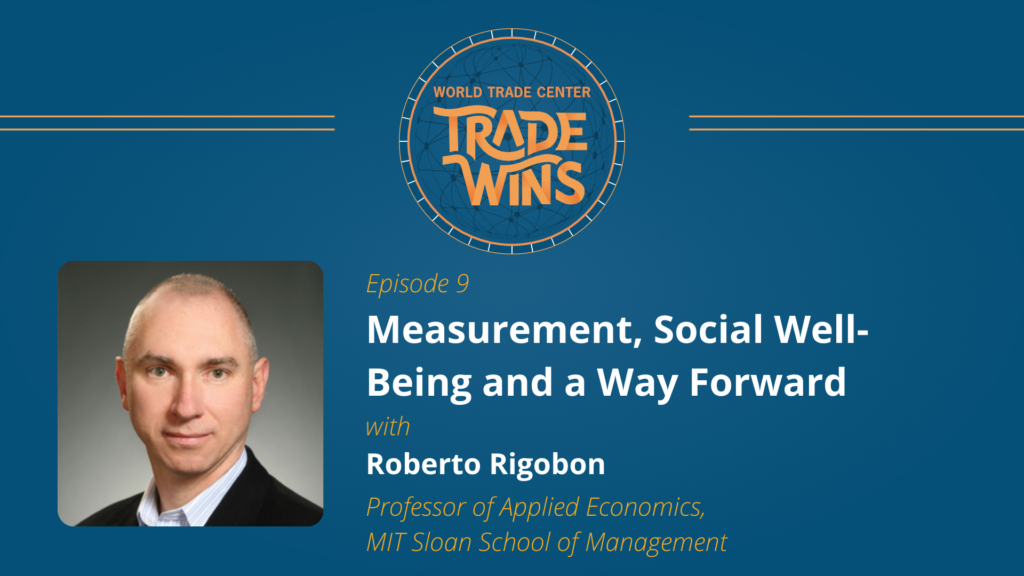Robin van Puyenbroeck 0:07
Welcome to Trade Wins. I am Robin van Puyenbroeck, your host, and I’m excited to present this special series of seven episodes with a set of unique conversations I had with global leaders from the public and private sector during the WTCA 2021 General Assembly. The conversations happened during the last week of April with a live virtual audience from 70 countries. This gave me the opportunity to also poll the global audience on some very pertinent questions. Poll results provided not only further food for thought but also calls to action. Now let’s get started.
Joining us from MIT Sloan in Boston is Roberto Rigobon, Professor of Management and Applied Economics. Roberto is a great inspiration for his students and infamous for making estimated measurements. He has worked on many projects such as the Aggregate Confusion Project with the Sloan Sustainability Initiative. Today, he will challenge us with his thinking on how we measure things or not measure things, and what the impact is on our well-being. Roberto, so good to see you again and to have you with us. Thank you so much. No doubt I am not doing your research or passion for measurements any justice here so let me go silent and hand it right over to you.
Roberto Rigobon 1:28
Well, thank you so much for the invitation. I love to be remembered for my sense of humor not by the content of my talks. Thank you so much for that. Today, I want to talk about measurement. I understand that if I tell you that measurement is just going out and measuring things like what a statistical office does, you will say that it has to be the most boring topic in the history of humankind. What I want to do is to show you two things—one that it is incredibly exciting and second is that indeed, it is incredibly necessary. First, let me tell you a little bit of a framework that I use at MIT to understand social well-being. I always say, how can I tell if a community, a city, a state, a country, a region is actually happy or is in some sense sustainable—sustainable from a very broad perspective not only from the environment. I use a framework that I call “PROMISE.” The “P” stands for personal aspects, “R” for relationships, “O” for organizations, jobs and culture, “M” for the markets and the economy, “I” for institutions, “S” for social, and “E” for the environment. The social part also includes politics. In that world of PROMISE, when you think about it, a society will be sustainable if you are sustainable in all of these dimensions. If you have a country where they are taking care of the environment, the social and the political aspects are fine, the economy is thriving, the institutions are respected, but people are super unhappy, that doesn’t look very sustainable to me. On the contrary, if you have a country where people are super happy but the economy is a disaster, the political system is a disaster, they’re destroying the environment, that reminds me of many countries in Latin America. That doesn’t seem very sustainable either. You need to have a balance across all of these dimensions. What is unfortunate is that we have a tremendous degree of ignorance about how well we’re doing in any of these dimensions. Truly, we pay close attention to the “M,” which is markets and the economy. We measure that very well. We have invested hundreds of years, literally hundreds of years of effort to measure our economic outcomes better. We created standards on finance, standards in accounting and standards on disclosure. We have statistical offices that work hard on producing meaningful statistics, almost all of them on how the economy is doing so it’s all about the “M.” We invest very little in the other dimensions. That’s why I think that measurement is a first-order degree issue. We need to pay attention to all the other dimensions. Otherwise, how can you tell if you’re doing it correctly? We don’t. We don’t measure happiness or sadness for that matter; we only measure suicides and cases of depression. We don’t measure the quality of the relationship between two individuals. We don’t do that. We mostly count how many times you break those relationships either in marriage or in business. We don’t measure how much we are destroying the environment, we mostly wait until we lose the lake to realize that the lake was being polluted. We certainly don’t measure social happiness or social unrest. We wait until the unrest is so dramatic that it is reflected by people rioting or protesting in the streets. We don’t measure the quality of our political system; we wait until we have two idiots as possible candidates and then we regret the whole process. I’m giving you examples of things that have happened in all our lives that we measure incredibly, incredibly late — extreme events.
Roberto Rigobon 6:25
Let me explain the four aspects of the bad measuring that we do. I hope that you realize, “How on earth can I make good decisions if I have to wait for the tragedy to take place for me to decide?” I believe that the world is making its choices that way. We wait until a tragedy takes place and we realize that the tragedy has taken place and then we react. It’s only that you’re reacting way too late — the tragedy just took place. So you wasted it — you wasted resources, you wasted human life, you wasted the happiness and the well-being of many individuals in your region, in your city or in your country. There are four implied aspects that our measurements tend to be very bad. Especially on social and labor aspects, they are particularly bad in a sense. One is, we tend to measure in a very infrequent way. We are lucky if we measure once a year. It is very difficult to make decisions when you measure only once a year. What happens is that you mostly have regret. Truly, that’s more or less what happens when I go to a doctor. I am almost 60 years old and every time I go to a doctor, she tells me, “Roberto, you are one year older.” I say, “Yeah, I could actually guess that because I came last year.” I have less hair and yes, as you can see, Robin and I go to the same barber. Then she tells me that I have gained about half a pound. So you know, it is a horrible experience. I don’t know about you, but that doesn’t sound like I want to be able to make a good decision. I have regrets for three weeks, I behave properly for three weeks, and after that, I continue eating my pasta. I’m of Italian origin; I cannot stop eating pasta. One of the aspects that happen is that we are measuring very infrequently. The second one is that we measure only these extreme events. Instead of measuring how you treat women in an organization, we only measure when the women are so upset that they either complain or file a complaint in the labor code or they quit. So again, we are not paying attention to the process of deterioration. The same way with the environment. We’re not paying attention to the process of deterioration; we wait until we lose the lake. The third aspect that is very important here is that we base a lot of our measurements on what the news outlets say. News outlets have a very short life to pay attention — a very, very short life. Let me just talk about the case of sexual harassment here in the United States. If you go back to the last 10 years, you would realize that about nine years ago, eight/nine years ago, almost all the sexual harassment cases that appeared on the news in the United States were in the military. Then from the military, they moved two years later to colleges and universities. Then, about three years later, they moved to Hollywood. I will say that from 2019 to today, there are no cases. You don’t see anything on the news about sexual harassment. There are only two options. One, we have solved the problem and therefore the treatment of women is great. Or, we’re not paying attention. I think it is the second one. I hope that everybody agrees that it’s the second one. We’re just not paying attention. It’s very difficult to solve the problems of, for example, discrimination or the problems of treatment of individuals if you only pay attention for six months. It is very difficult. You need to have a measurement that is there for a long period of time that is consistent. The last one is a technicality, but it’s an important technicality. We pay attention and construct these statistics that are meaningful only within certain ranges. Let me talk about drug consumption just to change the topic. Cities currently in the opioid crisis here in the United States measure the number of kids that enter emergency rooms or die. It happens to be that the number is coming down. They feel very happy about that. Again, I feel very happy that the kids are not dying, that’s for sure, of an overdose of opioids. But the reason why they’re not dying is that we have better treatment, not that we’re doing a better job. Truly, truly this statistic is not meaningful. The district attorneys of Boston and New York come and tell me, “Well, fewer people are dying, and I say ‘don’t take credit for it. You have done nothing to stop that.’” He says that “we now have a treatment that helps them.” We pay a lot of attention to statistics that create a false sense of accomplishment that makes us feel good. People call this greenwashing. A lot of organizations do greenwashing in the sense that they produce something and they target a statistic that makes them feel better even though they truly are not changing or improving their situation. It is very difficult to make decisions when we’re not measuring properly. I hope that I have convinced you that we make many mistakes. Not all the measurements are bad on everything. I want to clarify that. Some are relatively good in certain dimensions and others are weaker in all the dimensions. I certainly think that when I look at the word PROMISE — the personal aspects, relationships, and the last two letters, social, political, and environment, those we measure horribly. Everything that is in the middle of that word we do a little bit better. So we measure economics much better. We measure organizations better. Turnover, for example, businesses measure turnover. Institutions also measure things like respect for the law and respect for the rules of law, etc. We have invested as a society a lot of effort in the middle of “PROMISE.” We have disregarded the extremes. It’s not surprising to me that the world is in this massive amount of tension. Truly, if you don’t measure, it’s hard to pay attention. Therefore, we are disregarding a lot of aspects that are happening in our countries and our societies. We are only realizing that we’re making a mistake when the people are so upset that they start a demonstration. Again, we only pay attention for a little bit. I want to give you a challenge because, at the World Trade Center, you are actually at the center of world trade. Truly all the industries and organizations are there. I think one of the aspects that can help all of us and our societies is that these are conversations that we start within institutions and organizations and industries. When we have an industry, a trade conference on textiles, for example, I think it’s important to understand that there’s a role that they can play in measuring themselves better, not everybody else. What is the impact that you’re producing on others? Can you measure that better? Can you be transparent on that? These are very important questions. Those discussions will take place in your establishment. It happens there and actually having those conversations [allows you to] become open and honest. It’s important to be honest—to understand what the negative consequences of our actions are. It is the first step to start measuring better—when you recognize that you have a problem then you will have a chance. I would like to leave a lot of time for questions.
Robin van Puyenbroeck 14:03
Yes, of course. Thank you, Roberto, very inspiring. I love that you’re challenging us. We’re going to do a brief poll here. It is very scientific, you know, you’ll love this question. Also, please put all of your questions in the Q&A box. Question one for the poll is, “Do you have sufficient access to reliable data to make important decisions?” The second question is, “Do measurement problems tend to lead individuals to make bad decisions?” Let’s see what comes out of that. Roberto, I want to dig right into the challenge that you threw at us here that we’re at the center of world trade. First of all, I think it’s puzzling—the fact that we focus on measurement of regret and extreme behavior. I’m going to throw the challenge right back to you as a question. How can we make the connection here to what we measure in international commerce and then make decisions on those measurements? Especially given that the international trade infrastructure is visibly shaking on its foundations, if not broken, and it seems inadequate to deal with challenges, let alone making the system inclusive for everyone.
Roberto Rigobon 15:07
Yes, yes. Fantastic question. I think this is like equilibrium. As you see, Robin, we are in a bad equilibrium where we’re all competing internationally for lower costs. In that form of competition, we’re disregarding aspects that might be costly. We are strategically deciding not to measure because we don’t want to incur the costs of doing it better. We’re going to move away from this equilibrium. There are two possibilities. One is that regulators will take over. I don’t like that possibility. For example, I do think that Apple knows a little bit about the supply chain that they have, but they don’t know 100% of it because it’s too complex. I can understand that Apple has a problem understanding exactly every element of their supply chain. One thing that I know for sure is that a politician in Washington knows even less. If I’m going to have someone making decisions about the world’s supply chain, I don’t want that to be a regulator who is ignorant about the situation. The companies and industries need to understand that if they don’t propose better measures, somebody will come and force it. It’s a little bit of what’s happening right now in Europe where they are forcing disclosure of measurements. The statistics are not entirely correct. The statistics are to make their regulators feel better. That should not be the objective of humankind. The objective should be that the welfare of the Europeans improves and by that, the whole world improves. How the politicians feel is completely inconsequential in that equation. But if we don’t do something, we’re going to end up in that equilibrium where the politicians are going to call it. My advice would be that leaders at Apple, for example, start forcing the supply chain to be transparent and to disclose what they do. My advice would be to pick five areas that are important for Apple — so if the environment is one, if labor standards would be a second one — I’m guessing, but pick 5, you don’t need 64, just 5 aspects that matter. Then as the suppliers that are direct to Apple — force that disclosure on the ones that have two degrees of separation, then those with three degrees of separation.
Robin van Puyenbroeck 17:57
Yes, it’s fascinating because in a previous session we had someone talk about the notion of the private sector of companies being changemakers, game-changers in society, to make better decisions. We polled our audience and it was a whopping 100% of people agreeing that companies should play that role in society. I want to go a little further into what you just talked about, international commerce. We’re talking about the fact that crises also come from measuring the wrong things. We’ve been borrowing, we’ve been running deficits, we’re printing all the paper in the world and the world will buy it. Will we never have to pay our debt? Where’s it going to lead?
Roberto Rigobon 18:39
That second one, yes. Two things — one is that I do think that given COVID, excessive support was a good policy. I have videos in my classes and they are public on YouTube. In March of last year, when this was happening in the world, I remember saying, if I were a central banker or any policymaker right now, if I want to make a mistake, I want to make a mistake of giving too much help not too little. Too little in a situation of uncertainty will be devastating. I was advocating for a lot of expenditures and a lot of printing. It is exactly what happened. Robin, we’re going to pay. We’re certainly going to pay. We’re going to pay in the form of higher taxes and higher inflation, for sure. You can see that central bankers are starting to talk about the fact that they are seeing inflation. One of the things that I do is that I measure the inflation rate with Alberto Cavallo, a professor at Harvard right now. He was here at MIT and when we were together, we measured daily inflation rates by looking at retail prices worldwide on the internet. Our inflation right now, if you look from December to today, is about 6% in the United States. That is humongous. Germany is 4% and France is 4%. You have to understand that online prices tend to move much earlier and faster than the typical store. You would expect more inflation there, but we’re seeing numbers that are extremely, extremely high. The central bankers are going to start talking more and more about that. Either we pay more taxes or we pay off with an inflation tax. We’re going to pay with taxes. Now, I think, in this case, it was the right decision. Robin, if I were in March last year and I knew what I knew at that time, that was the right decision. I would have never guessed that we were going to create a vaccine in six months.
Robin van Puyenbroeck 20:57
Yes. I would agree that monetary expansion was necessary. But I’m now intrigued by what you said about measuring inflation. We’re back to measuring. Interestingly, you say that now that people are buying so much online, the data points that you use for measuring price increases and inflation are almost real-time versus in the past. How much of a delay was there, right?
Roberto Rigobon 21:24
A month and a half.
Robin van Puyenbroeck 21:26
A month and a half. That’s interesting. So in your opinion, do you see central banks loosening the ropes here, or what do you think? I hear you say that we are looking at an inflationary environment coming up. What firepower do central banks have left to deal with this at this point?
Roberto Rigobon 21:42
Given what I know today, if I were in the central bank, I would let the inflation rate of the developed nations get to 4%. I think we are going to go to 4% inflation. During COVID, many injustices were made that we have not measured correctly, for example, domestic violence. I want you to imagine and I want all the audience to imagine what happened in COVID. We have a family where there is likely to be domestic violence. What we did was to force that family to be together 24 hours a day and now in a situation of stress. If there was domestic violence before, it must have increased tremendously. We were not able to measure, Robin—because do you know how domestic violence is measured? By an interview that they do at home. But during COVID, I could not send the interviewer. We have not sent the interviewer yet. We’re in 2021. We are not going to measure this. We’re going to measure this by criminal records. If you think that the inflation rate is low because of a month and a half, imagine going through the process of filing a complaint to a police officer where they go to the district attorney and then file and process the individuals. It takes years. We do know that there were many injustices that took place during COVID. For example, there were school kids who were not able to go to school. My kids were all there, I’m pretty sure that is the case for most of the people in the audience. Our kids were able to continue studying because we all have internet access, we all have an iPad and they go to good schools. In some sense, we were badly affected, but it was not terrible. I want you to imagine what happened in Peru where 60% of the kids received one year of no education whatsoever. One good way to deal with this is to continue the support for a while. That means that the inflation rate will get to 4% almost for certain.
Robin van Puyenbroeck 24:00
Thank you so much, Roberto. Final question. I think you convinced us that measuring is not a boring topic. What motivated you to come up with this?
Roberto Rigobon 24:13
That is so interesting. It was in 2001. Between 1998 and 2001 — I don’t know if your audience is too young — but between 1998 and 2001 there was a massive increase in prices of oil; it increased about four times. Also, all the commodities increased by four times. Pick any commodity and it increased by four times. Food prices increased by five times and real estate increased by three times. It was a time of massive boom in these three sectors. In 2008, you remember that we measured the bubble incorrectly in real estate and we collapsed. That started between 1998 and 2001. In those four years, it was incredibly high. My question to the Bureau of Labor Statistics of the United States — I said, “Well, what is happening to the inflation rate in the different groups of the society? The poor in the United States consume housing five times or three times, food five times, and transportation three times. They have to be dying. The inflation rate of the poor has to be humongous. They didn’t have the data.
Robin van Puyenbroeck 25:32
A very unequal situation. It’s interesting to hear where your passion comes from.
Roberto Rigobon 25:38
That’s how I started it. I say, “This is unacceptable so I have to do it.”
Robin van Puyenbroeck 25:43
Good. Let’s see what our poll results are. It’s probably the most scientific poll that you’ve ever had. Question one, “Do you have sufficient access to reliable data to make important decisions?” I think it’s an important question because we’re here now thinking about the decisions we make every day. Do you have reliable information? Only 15% say, “Yes.”
Roberto Rigobon 26:04
Wow, that’s good.
Robin van Puyenbroeck 26:06
Then 23% say, “No,” which means they do not have sufficient access to reliable data. And 60% roughly says, “Sometimes.” This means that only 15% of people think that they have the data, the information or they think they have the data, the information they need to make important decisions. The second question was, “Do measurement problems tend to lead individuals to make bad decisions?” I will let you guess.
Roberto Rigobon 26:31
100% said yes.
Robin van Puyenbroeck 26:33
88% think that measurement problems lead individuals to make bad decisions. It’s a very important point for us to think about and to keep in mind. You gave us a challenge and a task, and we’re going to take that to heart. Roberto, with this, thank you so much for an exciting conversation. It’s contagious and I realized I may be obsessed with measurements myself, so my team will welcome that.
Roberto Rigobon 27:04
Thank you for the invitation. It was a great pleasure.
Robin van Puyenbroeck 27:09
I hope you enjoyed this special episode from our General Assembly. Make sure to tune in for all of the episodes. Thank you for listening.






